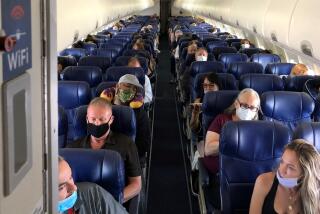On the Spot: Taking a stand when airplane seat mate has stinky feet
- Share via
Question: The last two times I traveled internationally, my seat companions removed their shoes, and the stench from their feet was unbearable. Since the airplanes are filled, asking to change seats is impossible. What options do I have? The cabin attendants wrinkled their noses but said nothing. I have another trip planned and would like to avoid a repeat. What options do I have? Any suggestions?
B. Hogue
Los Angeles
Answer: Before trying to find solutions, I asked for help with the science of why this happens.
Two issues are at work: one’s sense of smell and possible issues with the owner of the offending feet.
“The nose has multiple receptors for smell,” said Dr. Allis Cho, an otolaryngologist on the medical staff at Texas Health Arlington Memorial Hospital. “We have millions of neurons … and you can smell millions of types of odors.” Stinky feet presumably are among those.
Even people who have lost their sense of smell can still be jolted by a nerve that senses pain. Said another way, some odors — Cho mentioned ammonia — actually hurt.
As for the traveler’s fragrant feet, “It’s the bacteria that grow and cause the problem,” said Dr. Glenn Hardesty, an emergency medicine physician also at the Texas hospital. “Bacteria love places that are warm, wet and dark, and there are several places that can occur, the inside of the shoe being one of them.”
It’s possible the person has a medical condition that creates the odor and/or is inured to the aroma, which can happen, Cho said.
There is no easy way around this, but here are some ways you can make your life at 35,000 feet a little more comfortable:
— Hardesty said he was on a flight on which a passenger had frolicked a little too hard at his destination. When the still-tipsy traveler was seated, off came the shoes. Bad move. Hardesty made sure his air vent was directed toward his face. It helped, the doctor said, but didn’t completely overcome the issue.
— Cho suggested a mask (and given that many planes sound like respiratory disease factories, a mask isn’t unusual) on which drops of lavender or mint have been dabbed. A bit of Mentholatum under the nose works too.
— You also can try breathing through your mouth, she said. If you can still smell the odor after the flight, a nasal saline wash should banish the lingering effects.
— You might ask the person to put on his or her shoes. This doesn’t work well if the person is hostile or wearing flip-flops or open sandals.
This is where flight attendants and airline rules become your most powerful allies. If the attendants are wrinkling their noses, they are aware of the issue. Dealing with a delicate problem like this is but one of the reasons their jobs should come with hazardous duty pay.
You can bolster your argument for action with facts (because, post-takeoff, your case isn’t quite as easy to solve): Some airlines’ terms and conditions or contracts of carriage give the carrier the right to remove a passenger.
Here’s a sampling of some of the “rights of removal” I found in terms/contracts:
Under “Safety” in United’s contract of carriage, the airline says: “UA shall have the right to refuse to transport or shall have the right to remove from the aircraft at any point, any…passengers who have or cause a malodorous condition.”
American’s rules say, “Refusal or removal of passengers may be necessary for the comfort and safety of themselves or other passengers,” and in reason No. 6, it cites “persons who have an offensive odor such as from a draining wound.”
Lufthansa says, “We are entitled to refuse to carry you on your journey or onward journey or to cancel your seat booking, if … the carriage of you causes security risks, health or discomfort for other passengers.”
You may never need the airline’s contract of carriage, but it’s not a bad idea to carry it with you (on your phone or on a thumb drive) in case you need to make your point. Those contracts are full of juicy little tidbits about what the airline does and does not have to do that may come in handy when, on other matters, you have to put your foot down.
Have a travel dilemma? Write to travel@latimes.com. We regret we cannot answer every inquiry.
More to Read
Sign up for The Wild
We’ll help you find the best places to hike, bike and run, as well as the perfect silent spots for meditation and yoga.
You may occasionally receive promotional content from the Los Angeles Times.







